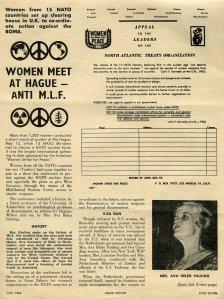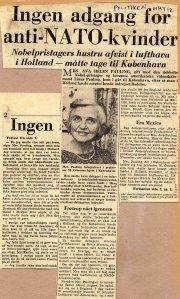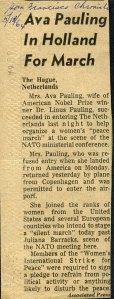
Linus and Ava Helen Pauling were well known for their support of one another’s work; particularly so when it came to the topic of world peace. As with all activists, the Paulings often found themselves encountering both support and opposition to their ideals. One instance of opposition made headlines around the world and showed that fame was at times both sword and shield for the Paulings.
By the spring of 1964, much of Ava Helen’s work as an activist was channeled through her involvement with Women Strike for Peace (WSP), a network of female peace advocates from across the United States. That year, Ava became one of the primary organizers of a meeting that was to take place in The Hague, Netherlands. The WSP called women peace activists from around the world to meet in The Hague to protest against the transfer of nuclear weapons from the United States to other North Atlantic Treaty Organization (NATO) countries.
At the time, it had been agreed that existing stockpiles of nuclear weapons should not be transferred between countries. The United States, however, was trying to make a case for the legal transfer of nuclear weapons to West Germany on the grounds that, when it came to international agreements, NATO allies functioned as a unit rather than as individual countries. Ava Helen and the WSP were successful in garnering the support and participation of women from every NATO country including, importantly, representation from West Germany.
Ava Helen and Linus’s plans to attend a peace conference in Mexico City just days before the WSP demonstration had made it unlikely that Ava would be present at the peace demonstration in The Hague. WSP members, however, urged Ava Helen to find a way to attend, and last minute arrangements did indeed make it possible for her to fly overseas for the meeting. Once arrived, however, it was Ava Helen’s absence from the proceedings which changed the outcome of what had been planned as a silent protest.

Days before the demonstration was to begin, the Dutch government – without informing WSP – banned the women’s peace demonstration and began preventing participants from entering the country. Unaware of this turn of events, Ava Helen boarded a flight from Mexico City to Amsterdam on May 10th, where a copy of The Triple Revolution was found among her belongings. The presence of this pamphlet was evidence enough for immigration officials at Amsterdam’s Schiphol Airport to recognize Ava as a participant in the demonstration.
The Triple Revolution was a memorandum, issued by the Center for the Study of Democratic Institutions, to which Linus Pauling had contributed. The document was addressed to President Lyndon B. Johnson and it rejected both the development of nuclear weapons and the move toward an economy dependent on machine-based labor. Published in pamphlet form, the document became an important component of WSP’s rhetoric, as it was applicable to issues of concern in both the United States as well as many other parts of the world. The Triple Revolution‘s notoriety as a radical proposal, however, placed its supporters in opposition to much of the leadership of the western world’s governments.
This is the context of what awaited Ava Helen when she arrived in Amsterdam. Having made the decision to ban the WSP demonstration, and cognizant of her role in its organization, the Dutch government made the decision to deny Ava Helen’s entry into the country. Not long after landing she was promptly put on to a different flight, this time bound for Copenhagen, Denmark.

By the time that Ava landed in Copenhagen, Linus Pauling had arrived at his home in Pasadena, where a call that he received at one o’clock in the morning alerted him to his wife’s situation in The Netherlands. In a personal note written at 1:15 AM on May 11th, Pauling expressed his frustration as well as his intent to notify the press about the incident. In a later note, he recalled the events of that day, condemning the incident as a “dictatorial action of oppression and prevention of free speech.”
Meanwhile, in Copenhagen, Ava Helen was met by news reporters who asked if she had mentioned to the Dutch immigration officials who she was and to whom she was married. To this Ava replied
I was certain they did not recognize my name or that of my husband and I felt that, as a matter of principle, I could not bribe officials by telling them I was the wife of a man who had won two Nobel Prizes.
Ava assured the journalists that the whole affair must have been a mistake and that the mishap would be taken care of. When a reporter contacted the Dutch embassy in Copenhagen, however, they found that Ava had been wrong: the Dutch government had in fact given orders to keep WSP members out of the country. The Danish press promptly published Ava’s story, which made news around the world.
When Linus called the Dutch embassy in Washington, D.C. he was told that the demonstration had been cancelled. Not knowing that the European media was already covering story, Pauling quickly made plans of his own for notifying the press. With journalistic efforts underway on two continents, questions began to arise concerning the legality and the implications for civil liberties of the Dutch government’s decision.
Back in the United States, members of Women Strike for Peace also flooded the Dutch embassy with questions regarding Ava’s denied entry and the suppression of their demonstration. These pressures ultimately compelled the Dutch government to retreat from its initial decision. That same day, the activist women who had made it into the country gathered in a silent demonstration outside of the Peace Palace in The Hague. Two days later, Ava entered The Netherlands and joined the women of WSP for their NATO meeting.
Ava Helen’s contretemps with Dutch immigration authorities stands as another example of the ways in which the Paulings’ fame both exposed and protected the two peace advocates. And while the Danish press had questioned why Ava didn’t use her last name to get into get into The Netherlands, it is clear that doing so was not necessary.
By the early 1960s, Ava Helen and Linus Pauling had become well-acquainted with the art of circulating their opinions through means of peaceful protest. As Ava wrote in a letter to Linus, had she used her name to enter the Netherlands, the meeting might not have taken place. Although initially anonymous, Ava’s role in the Women Strike for Peace demonstration and the attention that she received from the press, were crucial to the Dutch government’s decision to allow the meeting to take place and to making the demonstration news around the world.
